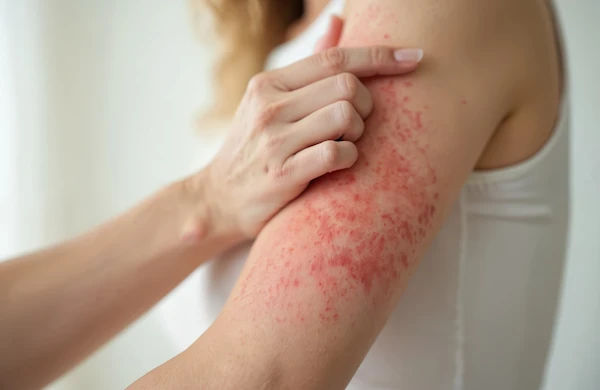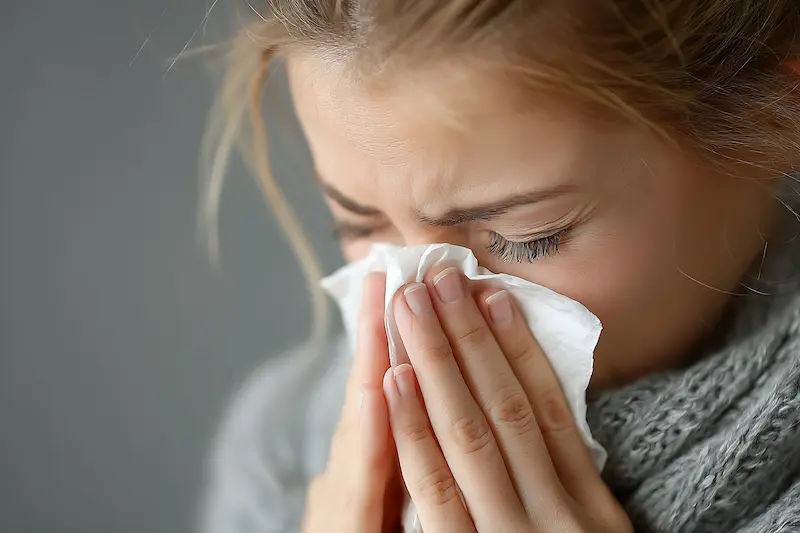Your Ultimate Guide to Allergies: Symptoms, Triggers & Relief
Explore the ultimate guide to allergies, covering common symptoms, triggers, and effective relief strategies. Understand how to manage seasonal, food, and environmental allergies for better health and long-term comfort.

Written by Dr. Mohammed Kamran
Reviewed by Dr. Rohinipriyanka Pondugula MBBS
Last updated on 13th Jan, 2026

Decoding the Immune System's Overreaction
At its core, an allergy is a case of mistaken identity. Your immune system, which is designed to protect you from viruses and bacteria, wrongly identifies a benign substance—like pollen or pet dander—as a grave threat. This triggers a complex chain reaction. Upon first exposure to an allergen, your body produces specific antibodies called Immunoglobulin E (IgE). These antibodies attach themselves to mast cells, which are found in tissues like the nose, throat, lungs, and skin. This process is called sensitisation, and you likely won't experience any symptoms at this stage.
The real trouble begins upon the second exposure. When the allergen enters your body again, it binds to the IgE antibodies perched on the mast cells. This signals the mast cells to burst open and release a cocktail of inflammatory chemicals, the most famous of which is histamine. It's the release of histamine that causes the classic allergy symptoms we all know—swelling, itching, redness, and mucus production—as your body tries desperately to flush out the "invader."
The Role of IgE Antibodies
IgE antibodies are the unique key that fits the lock of a specific allergen. Someone with a peanut allergy will have IgE antibodies specifically for peanut proteins, while someone with a grass pollen allergy will have IgE for that particular pollen. This specificity is why allergy blood tests can pinpoint your exact triggers by measuring the levels of different IgE antibodies in your bloodstream.
The Release of Histamine: Cause of Your Symptoms
Think of histamine as the alarm bell of your immune system. Its job is to make the affected area inflamed and noticeable, prompting you to take action. In your nose, it causes sneezing and congestion to expel the allergen. In your skin, it causes itching and hives to make you scratch away the substance. While effective in theory, this response is completely disproportionate to the actual threat, leading to your discomfort.
Common Allergy Symptoms
Allergy symptoms can range from mildly annoying to life-threatening, and they can affect various systems in your body. Understanding the full spectrum is key to identifying a potential allergy.
Respiratory Symptoms (Hay Fever, Asthma)
Often referred to as allergic rhinitis or "hay fever," these are among the most common symptoms:
Sneezing
Runny or stuffy nose
Itchy, red, or watery eyes
Postnasal drip
Coughing
Wheezing and shortness of breath (a sign of allergic asthma)
Skin Reactions (Eczema, Hives)
The skin is a common target for allergic reactions:
Hives (Urticaria): Raised, itchy, red welts that can appear anywhere on the body.
Eczema (Atopic Dermatitis): A chronic condition causing dry, itchy, and inflamed skin, often linked to allergies.
General Itching: Itchy skin without visible welts.
Swelling: Particularly around the eyes, lips, face, or tongue (angioedema).
Gastrointestinal Issues (Food Allergies)
Reactions to food allergens often manifest in the gut shortly after eating:
Nausea and vomiting
Stomach cramps
Diarrhea
Itching or tingling in the mouth
Severe and Systemic Reactions (Anaphylaxis)
Anaphylaxis is a severe, whole-body allergic reaction that is a medical emergency. Symptoms come on quickly and may include:
Constriction of airways, making it hard to breathe
Swelling of the throat, feeling like it's closing up
A sharp drop in blood pressure, leading to shock
Rapid, weak pulse
Dizziness or loss of consciousness
If you suspect anaphylaxis, use an epinephrine auto-injector if available and call for emergency medical help immediately.
Consult Top Specialists
How Are Allergies Diagnosed?
If you suspect you have allergies, a proper diagnosis is crucial for effective management. Self-diagnosis can be misleading, as symptoms often overlap with colds or other conditions. An allergist will typically use one or more of the following methods:
Skin Prick Test
This is the most common test. Small amounts of suspected allergens are pricked into the skin on your back or forearm. If you're allergic, a small, itchy bump (like a mosquito bite) will appear at the test site within 15-20 minutes. It's a highly effective way to test for many environmental and food allergens at once.
Specific IgE Blood Test
A blood sample is taken and sent to a lab to measure the levels of IgE antibodies specific to certain allergens. This is useful if you have a skin condition, are on medications that interfere with skin testing, or are at risk of a severe reaction from a skin test. Apollo24|7 offers convenient home collection for allergy blood tests, making the process seamless.
Elimination Diet and Food Challenge
For suspected food allergies or intolerances, a doctor may recommend an elimination diet. You temporarily stop eating suspected foods and then gradually reintroduce them while monitoring for symptoms. This should always be done under medical supervision, especially if a severe reaction is possible.
Effective Allergy Management and Treatment
While there is no absolute cure for allergies, a combination of strategies can effectively manage symptoms and improve your quality of life.
The First Line of Defence: Allergen Avoidance
The most effective way to prevent a reaction is to avoid the trigger:
Pollen: Check pollen forecasts, keep windows closed, shower after being outdoors.
Dust Mites: Use allergen-proof mattress and pillow covers, wash bedding in hot water weekly.
Pet Dander: Keep pets out of the bedroom, use a HEPA air purifier.
Food Allergens: Read food labels meticulously and inform restaurant staff of your allergy.
Over-the-Counter and Prescription Medications
These drugs help control symptoms but don't cure the underlying allergy:
Antihistamines: Block the effect of histamine (e.g., cetirizine, loratadine, fexofenadine).
Decongestants: Provide short-term relief for nasal stuffiness (e.g., pseudoephedrine).
Nasal Corticosteroids: Are the most effective long-term treatment for inflammatory nasal symptoms (e.g., fluticasone).
Epinephrine: The first-line emergency treatment for anaphylaxis (available by prescription in auto-injectors like EpiPen).
Long-Term Solutions: Immunotherapy (Allergy Shots/Drops)
Immunotherapy works by gradually desensitising your immune system to an allergen. It involves receiving regular, increasing doses of the allergen either through shots (subcutaneous) or tablets/drops under the tongue (sublingual). Over time, this can reduce the severity of symptoms and sometimes provide long-lasting relief even after treatment ends. If your symptoms are persistent and significantly impact your life, consult a doctor online with Apollo 24|7 to discuss if immunotherapy is a suitable option for you.
Conclusion
Living with allergies can be challenging, but it doesn't have to define your life. By understanding your triggers through proper testing, implementing smart avoidance strategies, and using the right medications, you can significantly reduce your symptoms and reclaim your comfort. Remember, knowledge is power. Use this guide and the accompanying allergies infographic as a starting point for a conversation with your doctor. Whether it's finding the right antihistamine or exploring long-term solutions like immunotherapy, effective help is available. Take control of your health today—if your condition does not improve after trying these methods, book a physical visit to a doctor with Apollo 24|7 for a comprehensive evaluation and personalised treatment plan.
Consult Top Specialists
Consult Top Specialists

Dr. Hariprasath J
General Physician/ Internal Medicine Specialist
19 Years • MD (Gen Med), FCCP, Dip (Diabetology, UK)
Chennai
Apollo First Med Hospitals P H Road, Chennai
(225+ Patients)

Dr Vinay Kumar A V
Nephrologist
8 Years • MBBS, MD - General Medicine, DM - Nephrology
Bilaspur
Apollo Hospitals Seepat Road, Bilaspur

Dr. Utsa Basu
Diabetologist
14 Years • MBBS , MD
Barasat
Diab-Eat-Ease, Barasat
(75+ Patients)

Dr. Santanu Mandal
General Physician/ Internal Medicine Specialist
17 Years • MD (Physician), DNB (General Medicine)
Kolkata
MCR SUPER SPECIALITY POLY CLINIC & PATHOLOGY, Kolkata
(25+ Patients)

Dr. Soumen Paul
General Physician/ Internal Medicine Specialist
24 Years • MBBS
Kolkata
MCR SUPER SPECIALITY POLY CLINIC & PATHOLOGY, Kolkata
(50+ Patients)
More articles from Allergies
Frequently Asked Questions
1. Can you develop allergies as an adult?
Yes, absolutely. While many allergies present in childhood, it is entirely possible to develop new allergic reactions in adulthood. Changes in environment, immune system function, or even viral infections can trigger the onset of adult-onset allergies.
2. What is the difference between a food allergy and a food intolerance?
A food allergy involves the immune system (IgE antibodies) and can cause severe, life-threatening reactions like anaphylaxis, even with tiny amounts of food. A food intolerance (e.g., lactose intolerance) involves the digestive system and is generally not life-threatening, though it can cause significant discomfort like bloating, gas, or diarrhoea.
3. Are there any natural remedies for allergy relief?
Some people find relief with saline nasal rinses to flush out allergens, using HEPA air filters, or consuming local honey (though scientific evidence for honey is limited). However, these should complement, not replace, a doctor-recommended treatment plan, especially for moderate to severe allergies.
4. Can allergies be cured?
Currently, there is no universal cure for allergies. However, treatments like immunotherapy (allergy shots or drops) can significantly reduce sensitivity to allergens, providing long-term relief that feels like a 'cure' for some people. Most treatments focus on effective management of symptoms
5. How long does it take for allergy symptoms to go away after taking an antihistamine?
Oral antihistamines typically start to work within 1-2 hours, with peak effectiveness around 4-6 hours. Newer non-drowsy formulas (like loratadine or cetirizine) provide 24-hour relief. Nasal sprays may take several days of consistent use to reach full effectiveness.



